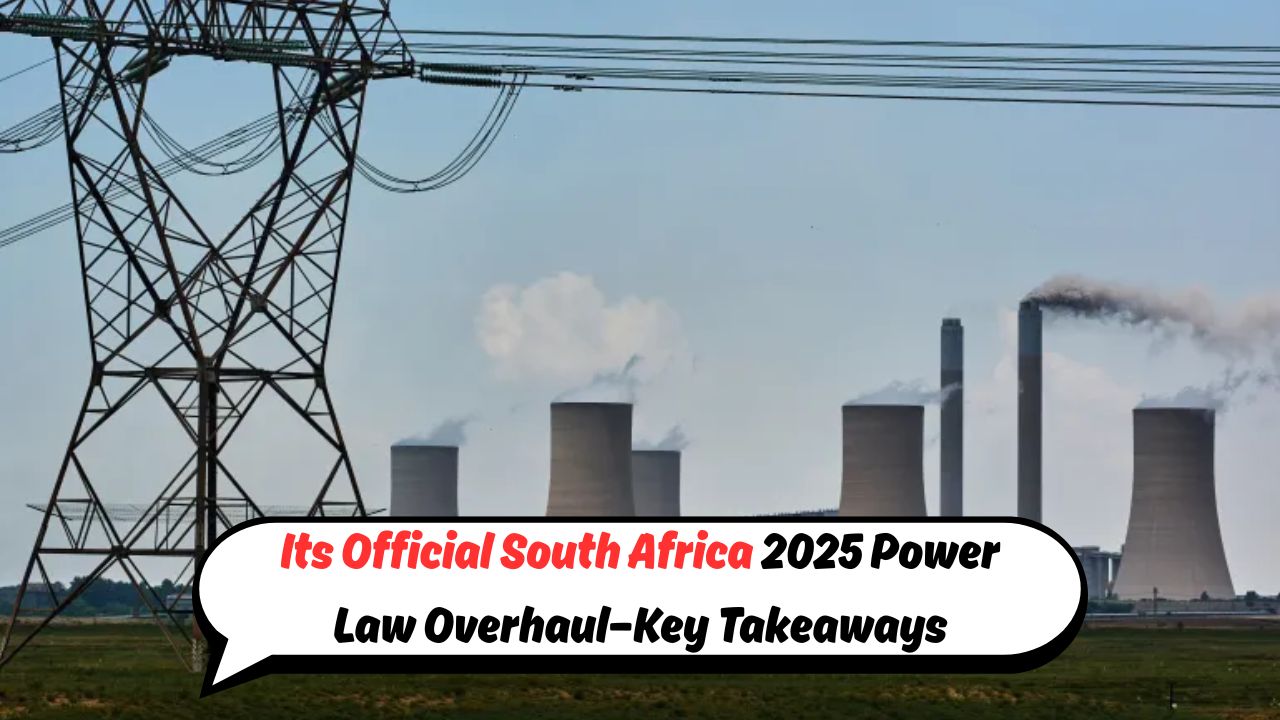South Africa 2025 Electricity Laws – South Africa’s 2025 electricity laws are set to bring some of the biggest changes the nation has seen in decades, directly impacting every household and business consumer. The government has introduced these reforms to address long-standing challenges such as power shortages, high tariffs, and unfair billing practices. With Eskom restructuring and new private-sector participation, electricity pricing and usage regulations will look significantly different from what citizens are used to. For ordinary South Africans, this means preparing for new compliance rules, better transparency in billing, and stronger penalties for illegal connections or unpaid bills. These reforms are designed to stabilize the energy sector, promote renewable energy adoption, and ensure fair access across provinces. While these laws are meant to benefit consumers in the long run, many South Africans are concerned about the immediate cost implications, adjustment to prepaid meters, and stricter disconnection policies. Therefore, it is crucial that every consumer understands what these laws mean and how they could affect daily life in 2025.
Key Highlights of South Africa’s 2025 Electricity Laws
The new electricity laws introduce stricter oversight over utility companies and aim to make the energy sector more competitive by allowing independent power producers (IPPs) to contribute directly to the national grid. This change is expected to reduce load shedding in the medium term and increase renewable energy supply. Consumers can also expect more accurate and transparent billing systems, thanks to smart meter rollouts that will replace outdated billing structures. Another major update is the inclusion of stricter penalties for energy theft and non-payment, which has been a serious issue across South Africa. However, these penalties are paired with better consumer rights protections, ensuring households are not unfairly disconnected without due process. The laws also include price restructuring, where low-income households may benefit from subsidized tariffs while high-usage consumers will pay more. This balance is aimed at ensuring fairness while maintaining sustainability of the power sector.
Impact on Households and Businesses
For households, one of the biggest changes will be the shift toward prepaid smart meters, which ensure real-time tracking of electricity usage and payments. This is expected to prevent unexpected bills but may cause inconvenience for those used to postpaid systems. Low-income families are promised support in the form of free basic electricity allocations, but middle-income and high-usage households may face higher tariffs. For businesses, compliance costs are expected to rise, especially for industries with high power consumption, such as manufacturing and mining. However, businesses will also benefit from more stable power supply and the option to source electricity from renewable providers. These reforms are aimed at creating long-term benefits, but businesses and households will need to adapt quickly to avoid penalties, disconnections, or higher-than-expected charges. In the short term, the transition could be financially demanding, but the overall goal is greater sustainability.
Consumer Rights and Protections
One positive aspect of the 2025 electricity reforms is the stronger emphasis on consumer rights. The laws now require utility providers to offer clear billing explanations, fair dispute resolution processes, and safeguards against wrongful disconnections. Consumers will also have the right to monitor their electricity usage in real-time through smart meters, giving them more control over monthly expenses. For low-income households, subsidies and government support schemes will play a vital role in reducing the financial burden of rising tariffs. The government has also introduced an appeal process, ensuring that no household is unfairly penalized due to administrative errors. This rights-based approach represents a major shift toward consumer-focused energy policy. While stricter penalties for illegal usage are part of the law, the balance of accountability between providers and consumers aims to make the system more transparent and fair.
Preparing for the Transition
As South Africa prepares for the rollout of these electricity reforms, consumers are advised to stay informed and plan accordingly. Households should familiarize themselves with prepaid and smart meter systems, as these will soon be the standard across the country. Businesses should review their energy consumption patterns and explore renewable energy partnerships to reduce costs. It is also important for citizens to keep records of their payments, report faulty meters, and stay updated on tariff adjustments to avoid unexpected expenses. The government and Eskom are expected to run awareness campaigns, but individuals must take responsibility to adapt to these changes. By understanding the new laws, monitoring usage, and taking advantage of available subsidies, South Africans can prepare themselves for a smoother transition. Though challenging at first, these electricity reforms have the potential to bring long-term stability, fairness, and sustainability to the nation’s power supply system.
